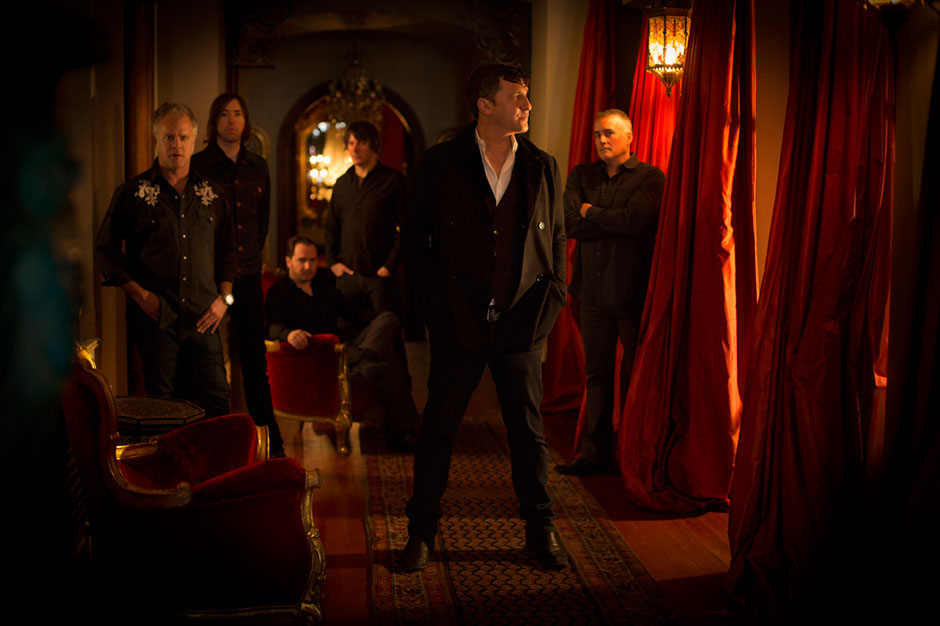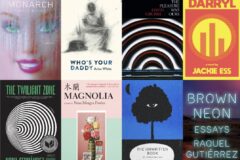Release Date: April 15, 2014
Label: Sub Pop
Allowing for grumbling from small cohorts of naysayers, it seems safe to posit that the Afghan Whigs have overseen the most artistically successful alternative rock reengagement of recent years (outside of Kathleen Hanna’s triumphant 2013 Julie Ruin return, that is). Perhaps you’re among the naysayers. You might point to the low bar set by the recent run of remarkably dispiriting ’90s alt reunions: the Pixies cycling furiously through Kim Deal replacements, or Billy Corgan noodling away inside Madame ZuZu’s. You might roll your eyes at the lothario shtick Greg Dulli’s been finessing since 1986. You might ask where in the Christ original guitarist Rick McCollum is.
Whatever your protestations, the Whigs have always stood slightly apart from their supposed peers. Sixteen years after their last proper release, it seems more ludicrous than ever to lump them in with any grunge movement, unless it’s possible to imagine Candlebox resurrecting themselves via a cover of R&B upstart Frank Ocean’s “LoveCrimes” or envision Tad alighting as Usher’s backing band whilst swinging through SXSW, to name just two surprising events that have helped define this band’s reunion. Never mind youthful energies—the Afghan Whigs have always pursued the kinds of qualities that needn’t necessarily diminish with age, like a visual flair courted both onstage (ruddy suits) and off (iconic album covers for Congregation and Gentlemen). Do to the Beast finds the group still boasting a surplus of panache; witness visual artist Amanda Demme’s wonderful cover photo of what appears to be a shirtless man giving himself a double-fisted cocaine facial. Likewise, lead vocalist/head louche Dulli’s dark obsessions and predatory narrators manage to sound as erotically entrancing as he pushes 50 as they did when he was courting 25, aging gracefully like a snifter of peaty scotch rather than a cup of flat beer.
But if Dulli’s let’s-brood-‘n-boogie sensuality (and a noticeably appreciative female audience) helped the Whigs avoid the alt nation’s uptight misérables, it was guitarist McCollum who brought the noize, his frenzied wah-wah glissandos and filthy slide coloring every corner of Dulli’s canvases. So McCollum’s absence from this project is notable, and his decision (forced or otherwise) to step aside due to personal complications ensures that Do to the Beast remains something shy of a full-on band return and just a smidgen too free of dirt. That casts a slight pall over this new offering, although the rendered blow is hardly fatal: by way of comparison, try and envision the Whigs minus Dulli—wait, where you going?
Perhaps anticipating howls of protest from Team McCollum, great pains have been taken to ensure Do to the Beast is something more than just another Twilight Singers or Gutter Twins outing. Original bassist John Curley is joined by funky drummer Cully Symington and bolstered by the dual-guitar tag-team of Jon Skibic and Dave Rosser, with opening track “Parked Outside” boasting four guitarists thanks to Clay Tarver of Chavez dropping some Led Zeppish doom wails into the mix. That thundering cut might be the heaviest track the Whigs have ever committed to tape, a two-note blooze-rawk thump that finds Dulli in full-on Steven Tyler mode, yowling, “If they’ve seen it all/ Show ’em something new.” And the soul inflections that have always added depth even to the band’s thrashiest numbers continue unabated, as indie’s most righteous brothers welcome aboard Usher compatriot Johnny “Natural” Najara and fellow Ohioan Van Hunt to the slow-bleed “It Kills” (with Van Hunt contributing deliciously distorted Bobby Womack falsetto).
Dulli’s vocal chops sound pretty all reet, too, his range having noticeably expanded since quitting the nicotine habit, now consistently hitting the high notes while maintaining the famed larynx crackle that ensures his place in the rock vocal hall of fame alongside fellow screamers John Lennon and Paul Westerberg. And despite plenty of R&B flourishes—the funky syncopation of “Matamoros,” freaking Isaac Hayes chukka-chukka on “The Lottery”—the Whigs as always steer clear of dreaded whiteboy mannerisms, thanks to Dulli’s reliance on phrasing rather than mimicry to impart soul. Credit the band’s home of Cincinnati, that Ohio/Kentucky border town that introduced both the Isley Brothers and Chuck Cleaver to the music world. Credit the basketball pickup games where a teenaged Dulli was first hipped to the existence of Brick and L.T.D. Credit a band that always shoots in CinemaScope, no matter how wounded or self-loathing the tale being told.
So, no, this album doesn’t much sound like Congregation or even 1965, which speaks to the ethos of a band that has always avoided going retro (again, note which R&B trendsetters Dulli and Co. are currently engaging with: Frank Ocean and Usher). Nor does it scale the heights or plumb the depths of Gentlemen, but give the lads a break: How many bands manage such an intricate break-up document even once in a career? And yet all their familiar qualities remain. There’s the divisive frontman assuming outsized roles: covetous (“I’m so excited you decided to come over and beg”), duplicitous (“My only cover was a con”), leering (“If I seem impatient/ You won’t be waiting long”), absurd (“I want the setting sun”), heartbroken (“It kills to watch you love another”). There’s the mournful balladry of “Can Rova” and “It Kills,” a patented brand of ache in line with old classics “Let Me Lie To You” or “When We Two Parted.” There are grandiloquent kitchen-sink flourishes like the faux-“Kashmir” strings atop synth-blatt bass on “Matamoros” or the spaghetti western sweep of “Algiers,” which kicks off with a Ronettes drum beat before the castanets explode. There’s baritone sax and muted trumpet drifting across shivering strings on melodramatic closer “These Sticks.”
And then there’s “Lost In The Woods,” a five-minute pocket symphony that juggles tempo and instrumentation with a deftness that would seem proggy if it weren’t so defiantly pop. One ominous piano vamp; a falsetto “surprise surprise”; swinging hi-hat jazz shuffle; then a bouncily soulful/Brian Wilson chorus flecked with sunshine, containing the sweetest “bay-bee” in Dulli’s repertoire, all ending amid cellos, soaring guitar, and an organ riff cheerfully clomping on by. The whole thing conjures the palpable sense of fun any longtime Whighead will tell you animated many a concert back during their initial run. The Whigs know how good this feels. So good, in fact, it seems like they can’t help but give the fans in the cheap seats a big wink. Cue Dulli: “You know me by now.”





